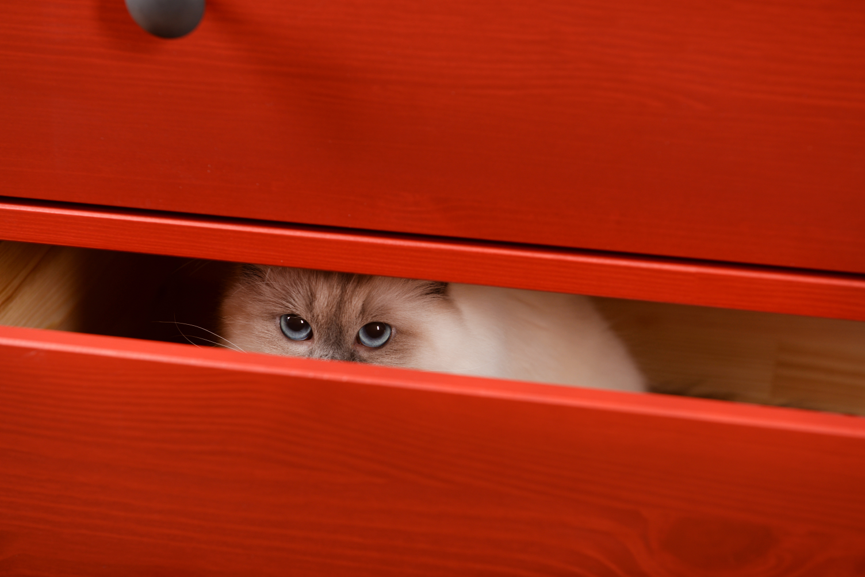What Is Pet Anxiety?
Anxiety is the feeling of worry, nervousness or unease caused by perceived dangers. Almost 80% of UK pets are reported to suffer with episodes of anxiety* which can bring about unwanted behaviors in your dog or cat.
What Causes Pet Anxiety?
There are a number of causes of anxiety in your pet but the most common causes include;
- Change – A house move, a new baby, building work, an unknown visitor, a new pet or other changes to an environment or routine can cause anxiety in your pet.
- Genetics – Genetics play a key factor in an animal’s likelihood to develop anxiety.
- Unexpected Loud Noise – Even the most relaxed dog or cat can become very stressed when exposed to loud noises like fireworks, the hoover or a drill.
- Poor Socialisation Stage Management – If the puppy or kitten wasn’t exposed to a variety of situations in its early life, anxieties may occur later on when faced with new experiences.
- Illness – Being ill or suffering with a painful physical condition increases anxiety
- History of Abandonment – Anxiety is commonly seen in pets that have had multiple previous homes, have suffered neglect or abandonment.
- Ageing – An older dog or cat can often develop symptoms of anxiety previously not experienced.
- Separation – Dogs are sociable by nature so being left at home alone often causes anxiety.
How Can I Tell If My Pet Is Anxious?
There are a number of symptoms that pets display when stressed or anxious so look out for the following:-
In Dogs;
- Barking excessively
- Ears pulled back
- Shaking
- Excessive panting
- Drooling
- Hiding
- Toileting in the house
- Licking lips
- Tail between legs
In Cats:
- Hiding
- Aggression; growling, hissing, scratching or biting
- Fleeing or startling easily
- Changes in grooming– especially grooming the tummy area more frequently
- Changes in appetite
- Increased facial rubbing
- Urine spraying
- Urinating or defecating in inappropriate areas
- Developing cystitis, a painful inflammation of the bladder that can be associated with stress in cats
My Pet Seems Anxious, What Should I Do?
The first thing to do if your pet is showing signs of stress and anxiety is to work out what is causing it and address it, if possible. For example, if the stimulus is outside like fireworks, close the curtains and turn on the television or radio. Try to distract your dog or cat.
If the situation causing the anxiety is unavoidable, tips to try include:
- Use a diffuser or spray that releases comforting pheromones, such as the Feliway Classic for cats or Adaptil which contains Dog Appeasing Pheremone (DAP) for your dogs. Pet Remedy is another product available that releases a blend of relaxing essential oils.
- Provide a quiet retreat that your pet can escape to and relax in away from stressful noise or stimulus. Cats love a high, safe perch so try to make sure one is provided.
- If separation anxiety is an issue, ensure that your dog has toys to occupy them and keep your departures and returns calm and quiet. Your vet can offer further advice if it’s an ongoing concern.
- It’s really important that anxiety-inducing behaviour is not punished. Your pet needs comfort and reassurance during times of stress and anxiety.

When to Ask For advice
Our veterinary nurses can offer lots of advice for reducing your dog or cat’s anxiety. If your pet suffers chronic anxiety, gets stressed about a specific issue such as being left alone, unavoidable loud noises or the cause is not immediately obvious, do get in touch.
If you are worried about anxiety in your pet or any have any other concerns please contact us.
St Kitts Veterinary Centre: 01252 844044
Basingstoke Veterinary Centre: 01256 844944
Crookham Park Veterinary Centre: 01252 913990
Firgrove Veterinary Centre: 01252 877799
* 2018 PDSA Animal Wellbeing Report






